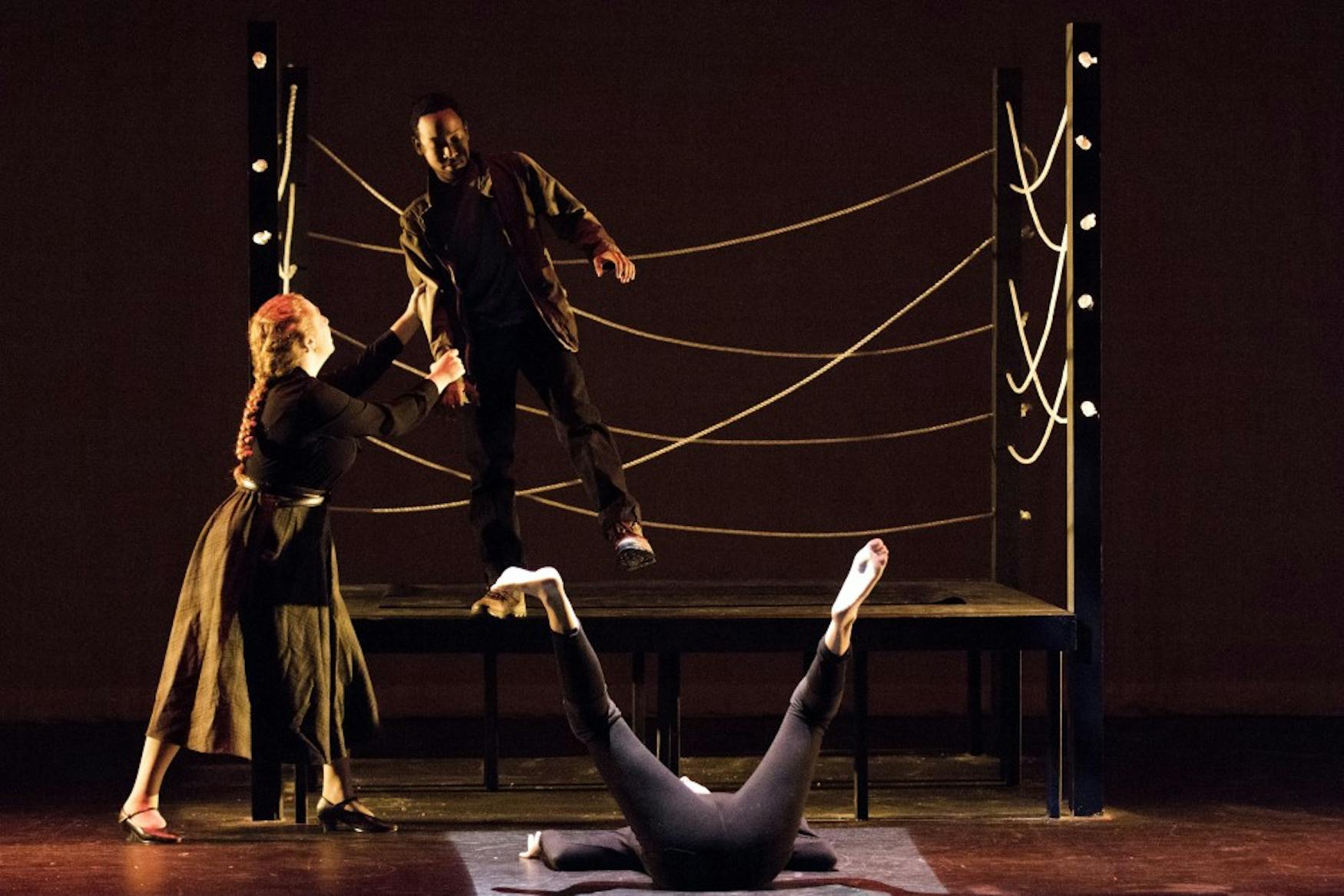‘Metamorphosis’ criticizes capitalism
REVIEW — A dark, minimalistic stage, lit only with a dim greenish hue, set the tone for an ominous “Metamorphosis.” Despite the Free Play Theatre Collective production’s adherence to minimal elements from set to actors to lighting and music, the overall effect was gripping and conveyed a poignant message about how today’s capitalist society does not leave room for humanity toward those who are unable to work.
The play, based off the novella of the same name by Franz Kafka and adapted for the stage by Steven Berkoff, was put on in the Shapiro Campus Center theater. Sivan Spector ’18 directed “Metamorphosis,” her first time directing at Brandeis. The play follows the trials of the Samsa family after an unexpected transformation leaves Gregor (Norma Stobbe ’20) the sole son and only working member of the family, trapped as a bug and unable to provide income. Spector did not initially aim to address a specific issue, but after rehearsals and conversations with the cast and production team, she chose to comment on the failings of capitalism through her interpretation of the play.
The set for “Metamorphosis,” designed by Aislyn Fair ’19, consisted solely of a raised platform and three stools. The platform is Gregor’s bedroom, which symbolically acts as a cage isolating him after his strange metamorphosis. Fair used crisscrossing ropes to establish the walls of Gregor’s room, which conveyed the sense of a web. This center-stage enclosure added to the play’s motif of entrapment, both within the physical limitations of one’s body, as well as within the expectations of society.
In contrast with the spare set, the physical acting required of protagonist Gregor Samsa was extraordinary and intense, capturing the attention of the audience throughout the play. One morning, Gregor wakes up to find himself in the body of a bug, unable to command his own movements or speak to his family. This random occurrence is made to be a tragedy and the play’s main source of conflict, due to the distorted values of a capitalist society.
Gregor’s parents, Mr. Samsa (Anderson Stinson III ’21) and Mrs. Samsa (Renata Leighton ’21), who had been supported by Gregor’s lucrative work ethic, are faced with a tough adjustment to their new lives as the parents of a monstrous burden. Gregor’s younger sister Greta (Maryam Chishti ’20) must also transition into a new role as she becomes the “keeper” of her bug brother. The Samsa family attempts to reconcile their reality with the new Gregor with varying levels of acceptance and compassion, each undergoing a metamorphosis of their own.
Before the family knows of Gregor’s transformation, his absence at work is recognized by the Chief Clerk (Amber Crossman ’21) who comes to investigate. Here, the family defends Gregor’s honor, assuring that their son must have fallen ill, not knowing the severity or permanence of Gregor’s condition. Later on in the play, the family welcomes a tenant into their home (Amber Crossman ’21), and when faced with his disgust at encountering Gregor, they merely apologize for the pest.
The most prominent change was that of Gregor’s sister, Greta, who struggles to move past her revulsion and accept Gregor. As the only member of the family who will enter Gregor’s room, the role of caretaker falls entirely on her shoulders. Chishti’s skillful range of emotional fits conveyed how the weight of this responsibility affects Greta until she begins to neglect and even resent it. At the conclusion of the play, Greta proclaims that the bug in the room could not possibly have been Gregor at all, because he would have known his presence was a burden and left. This proclamation brings on Gregor’s death, leaving the family liberated and blissful.

MOTHER AND SON: Gregor Samsa crouches in his web-like bedroom as his mother (Renata Leighton ’21) reaches in.
The conclusion highlights the idea that the only worth placed on individuals in this society is their ability to produce. As Spector described it, “Because we live in a capitalist society, as soon as you can’t work you just don’t have value anymore,” which is the harsh mentality that Spector wanted to highlight. The absurdity of Gregor’s condition exemplifies the indiscriminate hand of chance in determining one’s capabilities and, thus, one’s value to society.
Stobbe’s performance as Gregor was on point, involving distracting and uncomfortable body movements — so much so that no audience member was to forget Gregor’s presence or predicament, even for a moment. She accurately depicted the reality of how a capitalist society feels toward those with debilitating disabilities or mental illnesses.

FAMILY VALUES: The Samsa family crowds around the tenant (Amber Crossman ’21) as Gregor (Norma Stobbe ’20) lurks behind.
The acting of those who played Gregor’s family members explored the contradicting emotions involved with a “burdensome” loved one. Occasionally, the emotional turmoil appeared slightly extravagant, but this worked to engage the audience. The somber tone of the play was lightened up with well-timed, refreshing humor such as the ridiculous cacophony produced by Gregor’s dining habits, the relatable cliches of the family dynamic and the intriguing gait of the tenant.
Overall, “Metamorphosis” was a compelling production that forcefully draws attention to the skewed value system in America.



Please note All comments are eligible for publication in The Justice.